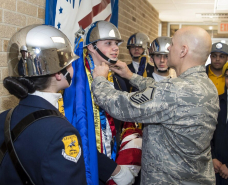The UK – Recruiting An Army Of Teenagers

Did you know that the UK armed forces recruit 16-year-olds? Owen Everett from ForcesWatch explores the UK military’s wide influence in the education system and the concerns that arise from this.
The UK is the only country in the European Union that recruits 16-year-olds, and the influence of the UK military within UK schools, colleges, and universities is increasing. This article focuses upon the military’s influence in secondary schools and colleges, and challenges the ethics of the UK’s military recruitment.
The armed forces have been involved in schools for years through the cadets and armed forces visits1. The Government has recently also been promoting a ‘military ethos’ within schools through a Department for Education’s Programme2. The armed forces make around 11,000 visits to schools and colleges each year encountering approximately 900,000 students. State schools are visited more frequently than private ones, and the programme is aimed at schools in more deprived areas. Vulnerable social groups, including those from poorer backgrounds, are thus targeted.
Visits to schools include careers events and presentations, military‐focused ‘development’ exercises such as team-building, leadership and interview techniques, interviews for pre‐recruitment courses at armed forces bases, and sessions with staff. Students also visit military museums and military bases for work experience.
The Military Ethos in Schools programme
The Military Ethos programme was created by the Department for Education in 2012 to promote a ‘military ethos’ in state schools in England that are seen as having behaviour and/or attainment problems.
The four main aspects of the programme are:
Expansion of the Combined Cadet Force (CCF)
Combined Cadet Forces do military training in schools. 100 more of them are being set up in disadvantaged state schools by 2015. The government hopes that all willing state schools will have a CCF by 2020.
Troops to Teachers
This scheme gives military veterans a quicker route into teaching than people from other backgrounds. It is unique in being a way for non-university graduates to become a teacher. The scheme is struggling: only 102 veterans are due to become teachers so far after the target was set at 1000. However, it recently received a lot more funding.
‘Alternative Provision with a military ethos’
A set of military-style activities replace normal lessons for students who are either “disengaged with education or at risk of becoming disengaged”.
Academies and Free Schools
Lastly, there are proposals for military ‘academies’ and ‘free schools’ which would be new types of schools in the UK that receive state funding but that are independent from local authorities. Many new academies have taken on elements of the Military Ethos in Schools programme, such as the Combined Cadet Force unit.
Other forms of military influence in schools include a wide range of curriculum-related teaching materials. There are also scholarships for students between the ages of 16 to 18 (worth £1000-1500 per year), requiring students to enrol in the armed forces for at least three years after school or university unless they repay their scholarship money. In addition, over 250 ‘community cadet units’ use school premises for their training sessions.
Why is all this a problem?
The UK armed forces are the only armed forces in the EU, and one of only nineteen countries worldwide that recruit 16-year-olds. Although you can now only be deployed to a war zone if you are 18 or older, those joining the Army at 16 were statistically shown to be twice as likely to be killed in Afghanistan as those joining as adults. This is because they are over-represented in sections that experience the most traumatic combat, and because they tend to stay in for longer. The risks of serious physical and mental injury are also much higher for these young disadvantaged recruits. In addition, the armed forces are the only employer where you can face a criminal conviction if you break your contract: for over-18s, after the first three months you usually have to stay in for a minimum of four years.
In presenting a positive, sanitised view of the armed forces as a vital institution with exciting career options, too often the risks (including high rates of sexual harassment), the uniquely restrictive legal obligations, and the ethical questions around warfare are overlooked. Needless to say this affects the individual students who join the armed forces, but it also broadly affects society when military solutions to problems are favoured over non-military options.
While the Department for Education claims that the Military Ethos in Schools programme is only about improving students’ educational attainment, some of the research behind the programme highlights the benefits to armed forces recruitment and the employment of veterans. The programme is based on the premise that military approaches are uniquely capable of addressing students’ bad behaviour and low attainment. Many teachers’ unions’ have expressed concerns about Troops To Teachers’ fast-tracking of non-graduates into teaching jobs, and about what military-style discipline would be like in a school context.
What you can do about it?
Concerns about the military’s influence in UK schools and colleges have been raised by many different people and in many ways, from articles in numerous publications, to workshops, to meetings with head teachers and politicians.
It is possible to get the military out of schools. After all, there are many schools that aren’t visited by the armed forces, and the majority of schools do not have a Combined Cadet Force. To ensure that that there is a critical discussion to balance out the military’s influence you can, for instance, provide teachers with resources3, or invite speakers from organisations that can provide alternative viewpoints4.
Head teachers decide whether they want to allow the armed forces to visit the school, and whether to have a Combined Cadet Force – here are some ways you can influence them if a school you know experiences this:
• Find others who share your concern and meet with the head teacher: Ask whether parents/guardians, teachers, governors and students were consulted about the military influence, and what the school’s arguments are for this influence. Raise your concerns and point out that there are non-military approaches to improving attainment and behaviour. If the head teacher refuses to meet with you, you could write to them with as many signatories as possible, and use social media, banners and local media to raise your concerns.
• Exempt yourself from taking part in military activities: You can ask difficult questions at military presentations and stalls. You can also ask to be exempted from military activities, and if you are told you have to take part, you can refuse to do so and state your reasons.
• You can also make Freedom of Information requests to the Ministry of Defence. For example, you can inquire as to how many armed forces visits there have been to schools in your area, and the types of activity they did. Alternatively you can ask your Local Education Authority to find out which local schools have Military Ethos initiatives.
Text: Owen Everett
Photo: “Step Up: British Army recruitment poster in Brighton” – gw1/Creative Commons.
1 Visit these site for further information: http://data.parliament.uk/DepositedPapers/Files/DEP2008-2922/DEP2008-2922.doc and https://www.gov.uk/the-cadet-forces-and-mods-youth-work.
2 See: Military Ethos.
3 See, for instance: http://www.forceswatch.net/young-people-military.
4 You may, for instance, consider Forceswatch or Veterans for Peace UK.
Source: Generation C
Countering Military Recruitment

WRI's new booklet, Countering Military Recruitment: Learning the lessons of counter-recruitment campaigns internationally, is out now. The booklet includes examples of campaigning against youth militarisation across different countries with the contribution of grassroot activists.
You can order a paperback version here.







